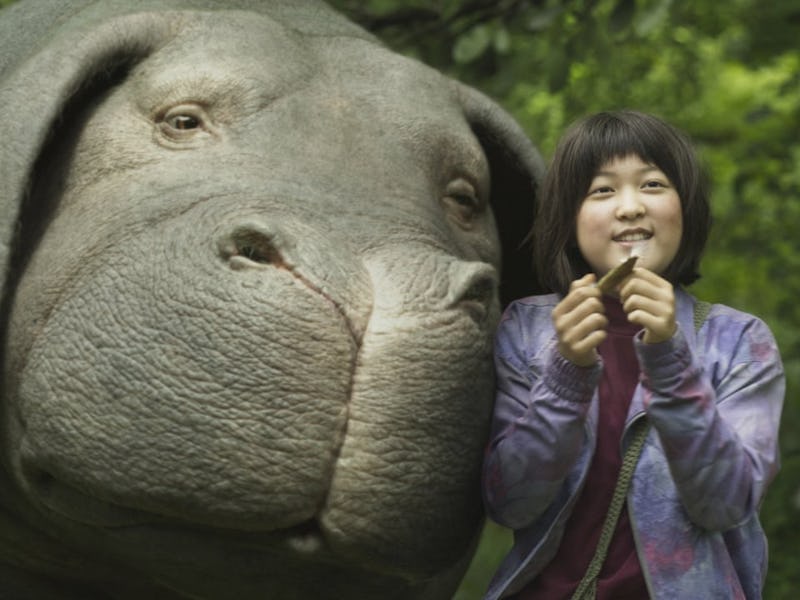You need to watch the smartest sci-fi movie on Netflix ASAP
Before Parasite, Bong Joon-ho quietly delivered a tonally ambitious sci-fi adventure.

A girl and her best friend grow up together in a lush, verdant landscape. One of them has a destiny, and they must eventually separate for what they’re told is the good of mankind. But until then, their days are idyllic, filled with romps around mountaintops and snacks of pilfered persimmons. The consumption and corruption that governs the rest of the world doesn’t touch them — at least, not yet.
Our relationship with the natural world has long been a foundational cornerstone of the sci-fi genre, both in print and on celluloid. Authors like Philip K. Dick, Octavia E. Butler, Jeff VanderMeer, and Kim Stanley Robinson put their concerns about climate change — and our role in it — on the page. Meanwhile, cinematic classics like King Kong and The Birds ponder our impact on fragile ecosystems we don’t fully understand, while Jaws and Jurassic Park poke at the extremities of human hubris.
Think of Dr. Ian Malcolm’s legendary assessment in the latter: “Your scientists were so preoccupied with whether or not they could that they didn’t stop to think if they should.” How do our choices reverberate outward, affecting the only planet we have? Sci-fi is about systems of power, failures of responsibility, and oversteps in ambition. Few directors have navigated these machinations with as much grace, glee, and danger as Bong Joon-ho does in his 2017 film Okja (streaming on Netflix).
Bong’s filmography is characterized by films that take a step back from the way we live and wonder why we accept what we do. That approach has helped him craft two sci-fi classics: 2006’s The Host, about a mysterious creature that bursts from the South Korean sewers, and 2013’s Snowpiercer, in which humanity’s last survivors travel around a frozen planet in a class-divided, highly stratified train.
Ahn Seo-Hyun in Okja.
Chris Evans’s “I ate a baby!” speech from the latter film became its standout moment, but both Snowpiercer and The Host force their viewers to consider what we would do to survive in a world whose inherently unforgiving nature is laid bare. The zaniest expression of this methodology is Okja, a film that is many things:
- A candy-fueled sugar trip through a slaughterhouse, with absurdist performances from Tilda Swinton and Jake Gyllenhaal (both wearing smiles that look like screams) and bizarre costuming choices (the adult braces on the former, the teeny-tiny shorts on the latter).
- A further extension of Bong’s anti-capitalist leanings and his distrust of people in power who promise progress (see: 2019’s Parasite).
- A slight criticism of making a political mission your entire identity.
- A tender portrait of a friendship between a girl and her gigantic pig/elephant/hippo thing,
- And an argument that family isn’t an exclusively human concept.
Ahn Seo-hyun stars in Okja.
With energy and atmospherics that resemble those of a deranged carnival, Okja draws us in and pushes us away at the same time, with the “kind of our reality, but not quite our reality” tension sci-fi so delights in exploring. In 2007, the Mirando Corporation announces a new breed of “big pig,” engineered to leave a minimal environmental footprint, live extremely long, and “taste fucking good” — or so says haughty CEO Lucy Mirando (Tilda Swinton). Of the 26 pigs sent to farmers around the world, one ends up in South Korea, where tween Mija (Ahn Seo-hyun) lives with her grandfather.
Mija and the super pig, whom she names Okja, become best friends. Okja’s character design, particularly the animal’s expressive face, helps to sell this bond. But after 10 years, the Mirando Corporation wants its specimens back. And so Mija and Okja are caught between various forces: Lucy, who wants to retain power over the company; Dr. Johnny Wilcox (Jake Gyllenhaal, perpetually sweaty), a zoologist and TV host who has his own nefarious plans for the super pigs; and the Animal Liberation Front (ALF), led by leader Jay (Paul Dano) and South Korean translator K (Steven Yeun). Who among these characters has Mija and Okja’s best interests at heart, if any of them?
Tilda Swinton and Ahn Seo-Hyun star in Okja.
The film careens forward, hurtling with the same bulk and energy of Okja chasing Mija around the mountaintop or the ALF trying to guide Okja through a crowded shopping mall. No one here is entirely good, and most people are in fact varying degrees of bad. Consider the smugness displayed by architects of international capitalism, the selfishness of people who refuse to consider animals as anything other than meat, and the self-congratulatory nature of those who consider only a broad cause rather than the individuals they’re meant to protect.
But in a world where everyone is compromised, the people we choose to trust say something about our priorities, about what we value, and about who we want to be. Those tenuous alliances are what drive Okja. Swinton and Gyllenhaal’s sneeringly broad villains contrast well with Dano’s soft-spoken, beatific Jay and Yeun’s chastened, trying-to-be-selfless K. And Ahn, with eyes that go from beseeching to furious, is the film’s vulnerable emotional core.
Boardrooms and factory floors are equally capable of housing violence, and Bong desaturates the film’s initially vibrant color palette to communicate the increasing amorality of his milieu. And yet Okja never loses the thread when it comes to its central argument: that civilization and humanity are increasingly dissimilar.
Through its duality of serenity and disgust, Okja questions what we owe each other — an evergreen sci-fi question that Bong has made his own.
Okja is now streaming on Netflix.
This article was originally published on